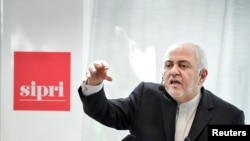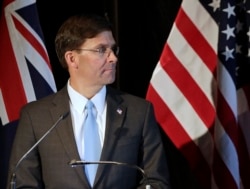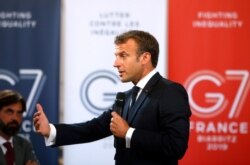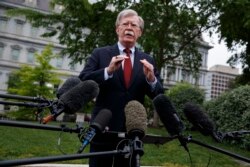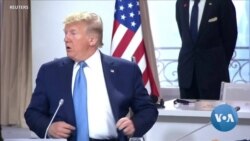Report updated 4:15 p.m., Aug. 28, 2019.
VOA Persian's Katherine Ahn contributed to this report.
WASHINGTON - Both the United States and Iran denied Wednesday that they were looking to ratchet up tensions with each other.
"We are not seeking conflict with Iran," Defense Secretary Mark Esper told reporters at the Pentagon.
Iranian Foreign Minister Mohammad Javad Zarif also said during a visit to Japan for talks with Prime Minister Shinzo Abe that his country is not seeking to intensify disagreements with Washington, but wide differences remain over Iran's nuclear weapons program and Washington's economic sanctions on Tehran.
Zarif said Iran believes "every nation should be allowed to exercise its own rights under international law."
Abe visited Tehran earlier this year in an attempt to serve as a mediator between Iran and the United States.
This week, U.S. President Donald Trump said "there's a really good chance" he would meet with Iranian President Hassan Rouhani to negotiate a new agreement to limit Iran's nuclear program in place of the 2015 international deal Trump withdrew from last year.
But Rouhani said if Trump wants to hold talks, he must "take the first step" and lift all of what he called the "illegal, unjust and unfair" sanctions the United States has imposed on Iran.
Trump put his own conditions on possible negotiations, saying Iran could not create more overseas tensions with military advances and attacks. He also said a new deal would have to ban Iran from developing nuclear weapons and testing ballistic missiles, and that it would have to cover a longer period than the 10-year time frame called for in the 2015 accord.
The U.S. leader's comments came at the summit of G-7 leaders in France.
French President Emmanuel Macron invited Zarif for talks at the summit site on Sunday as part of his own continued effort to broker U.S.-Iran talks.
Macron said Monday he had reached the "very cautious" conclusion that Washington and Tehran could reach an agreement if Trump and Rouhani met. He added that if such talks do occur, France would "play a role," along with the other signatories of the 2015 agreement —Britain, China, Germany, Russia and the European Union.
U.S. National Security Advisor John Bolton said in an interview Tuesday in Kyiv with Radio Free Europe/Radio Liberty that Iran cannot hope for sanctions relief without an all-inclusive agreement.
"The idea that Iran would receive some tangible economic benefit merely for stopping doing things that it shouldn't have been doing in the first place is just a nonstarter," Bolton said. "If there's a comprehensive deal, then, of course, the sanctions would come off at that. When the regime in Iran is ready to talk about that, then there will be a meeting."
In a Monday interview with VOA Persian, foreign policy researcher Luke Coffey of the Washington-based Heritage Foundation said Trump's expressed openness to talks with Rouhani indicates a possibility of such a meeting within the coming months.
"But I think that we need an extended period of calm in which we don't have Iranians taking ships in international waters and, let's say, the U.S. is not ramping up even more sanctions," Coffey added. Iran seized British-flagged oil tanker Stena Impero in the Persian Gulf on July 19, accusing it of violating international maritime rules. Britain said it was Iran that violated international law by seizing the vessel in Omani waters.
Speaking separately to VOA Persian, Washington Institute for Near East Policy senior fellow Barbara Leaf said a potential Trump-Rouhani meeting would not in itself resolve decades of hostility between the two sides.
"A meeting ... will be quite a seismic event if that is to occur. But a meeting is not a negotiation, which necessarily will be a long and complex task," she said.




